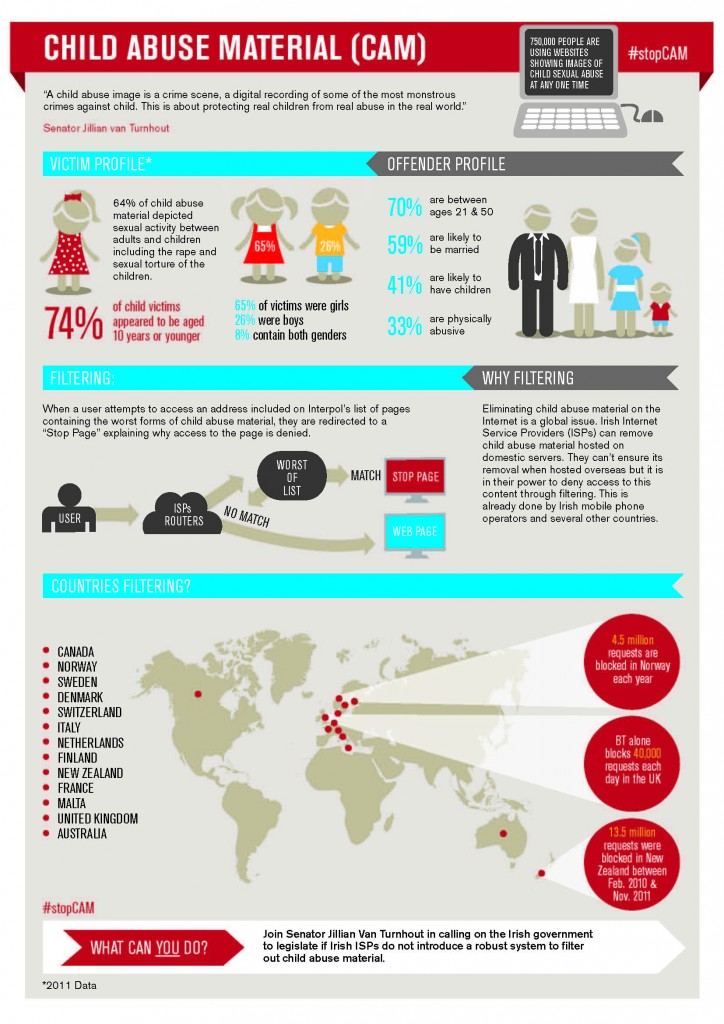21st March 2012
Column: Blocking child porn isn’t about censorship. It keeps children safe.
The rights of children must come first – and it’s time to block images of the worst sexual abuse, write Senators Deirdre Clune and Jillian van Turnhout.
CHILD ABUSE MATERIAL is often spoken about as “child pornography” but it is far more serious an offence than can be encompassed by any single definition. A child abuse image is a crime scene, a digital recording of rape, incest, assault, sadism and bestiality being perpetrated against a child.
The sheer horror of such images is closer in content to depictions of the atrocities of war by those who perpetrate them. It is imperative that Irish internet service providers move to block child abuse material to prevent the proliferation of these images.
Think for a moment about the most humiliating and degrading moment you have ever experienced. Think of the desperate helplessness you felt. Now imagine that someone had managed to capture that moment. That image was then spread across the globe so that no matter how far you ran you could never be sure that those you meet did not see it. Now imagine the scenario for a victim of child sexual abuse whose trauma has been recorded and disseminated for the sexual gratification of others. Try to comprehend the on-going harm that victim suffers as long as the image remains available for others to view, their sense of being re-abused again and again and being defined by defilement for ever.
Blocking child abuse material on the internet is not going to stop those who are determined to view it. Traders will share their collections via peer-to-peer, email and other services. The blocking measure is aimed at those who stumble across one image inadvertently and whose curiosity sparks a dangerous spiral, which leads them to seek out more. Interpol describes these individuals as ‘simple viewers,’ and their statistics show that one in three simple viewers go on to abuse a child themselves.
We live in the information age. A photo taken in one part of the world can reach into millions of homes within seconds of being uploaded. It can seem inconceivable that images of child abuse are being sought online. However, a huge volume of requests are made to access child abuse material, intentionally or accidentally, through standard webpages throughout the world. For example, 4.5 million requests are blocked in Norway each year; 13.5 million requests were blocked in New Zealand between February 2010 and November 2011; and BT alone blocks 40,000 requests each day in the UK.
’750,000 people are using websites displaying images of child sexual abuse at any one time’
In 2009,the UN-Special Rapporteur on the sale of children, child prostitution and child pornography, Najat M’jid Maalla, stated that 750,000 people are using websites displaying images of child sexual abuse at any one time. Attempting to eliminate child abuse material on the internet is a difficult task. As soon an image is removed it can spring up again in another location. Google and Facebook have their own systems in place to block such images. Mobile operators in Ireland also block this material under the Alliance Against Child Sexual Abuse Content.
While Irish ISPs do secure the removal of child abuse material on domestic servers, they are yet to follow the likes of Australia, Denmark, Finland, Italy, Malta, New Zealand, Sweden and the UK by blocking the same material hosted overseas, where removal proves difficult or takes an unreasonable length of time.
There are those who will argue that any form of blocking content online is an infringement on their civil liberties. The only images which are being targeted are those which fall into Interpol’s list of the three most severe forms of child sexual abuse: assault, gross assault and sadism/bestiality. Even the most ardent opponent of internet censorship cannot argue that failing to block the spread of these images of child sexual abuse maintains virtual freedom.
Having robustly debated this issue in the Seanad recently as part of a private members motion proposed by the Independent Group of Senators (Taoiseach’s Nominees) we are even more committed to tackling this issue through the introduction of a blocking system. In response to the motion Minister for Justice Alan Shatter assured the Senate that the Government abhors the evil trade in illegal images of children being sexually abused and pledged his commitment to fully consider blocking internet child abuse material in the development of the planned Sexual Offences Bill.
Deirdre Clune is a Fine Gael senator, and Jillian van Turnhout is an independent senator.
Article link: http://www.thejournal.ie/readme/column-blocking-child-porn-isn%e2%80%99t-about-censorship-it-keeps-children-safe-390656-Mar2012/
